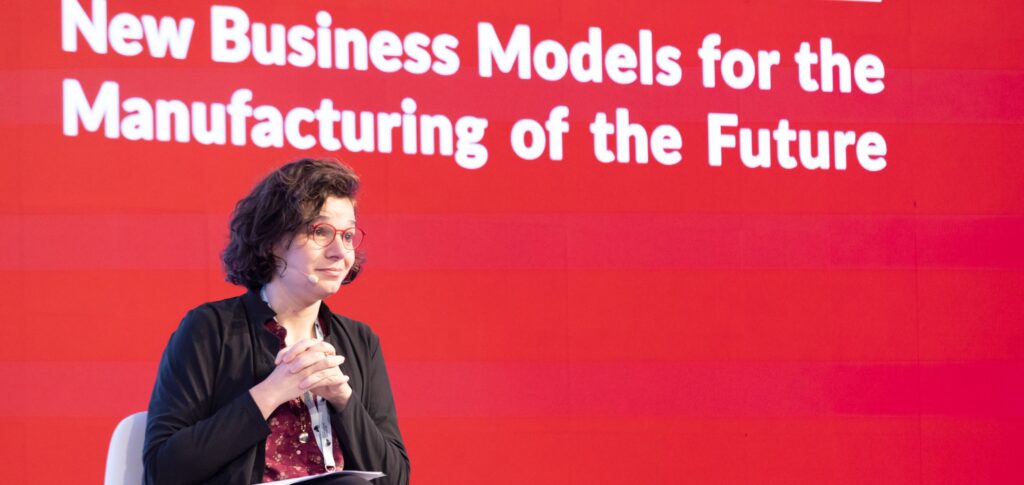World Manufacturing Forum 2023
Amidst the proliferation of global crises and escalating demands, the manufacturing industry is seeking solutions to enhance its competitiveness and resilience. One way to achieve this is through the adoption of innovative business models that pave the way for the manufacturing of the future.
By bringing together industry leaders, global policymakers, eminent academics, and research innovators, the World Manufacturing Forum 2023 provided the audience with a unique opportunity to gain valuable insights into the essential themes and groundbreaking strategies behind the unfolding transformative revolution in the manufacturing sector.
“Achieving Net-Zero value chains for sustainable manufacturing business models”
The commitment to fostering a more sustainable manufacturing industry has become paramount.
Following the recent COP 28 Summit in Dubai, Andrea Cabrini, Managing Director at Class CNBC and event moderator, emphasised the imperative to explore new energy-efficient operating models. This sentiment set the stage for the panel discussion on “Achieving Net-Zero Chains for Sustainable Manufacturing Business Models”, which inaugurated the second day of the World Manufacturing Forum 2023.
On stage, Andrea Cabrini was joined by Caroline Viarouge, Chief Executive Officer at EIT Manufacturing, Milan Kumar, Chief Information Officer at ZF Commercial Vehicles, and Ken Somers, Partner & Master Expert at McKinsey & Company. From digital technologies and skilled workforce to circularity and decarbonisation principles, the speakers engaged in an informative discussion, highlighting Europe’s potential in leading the global transition towards a greener manufacturing for a more sustainable future.
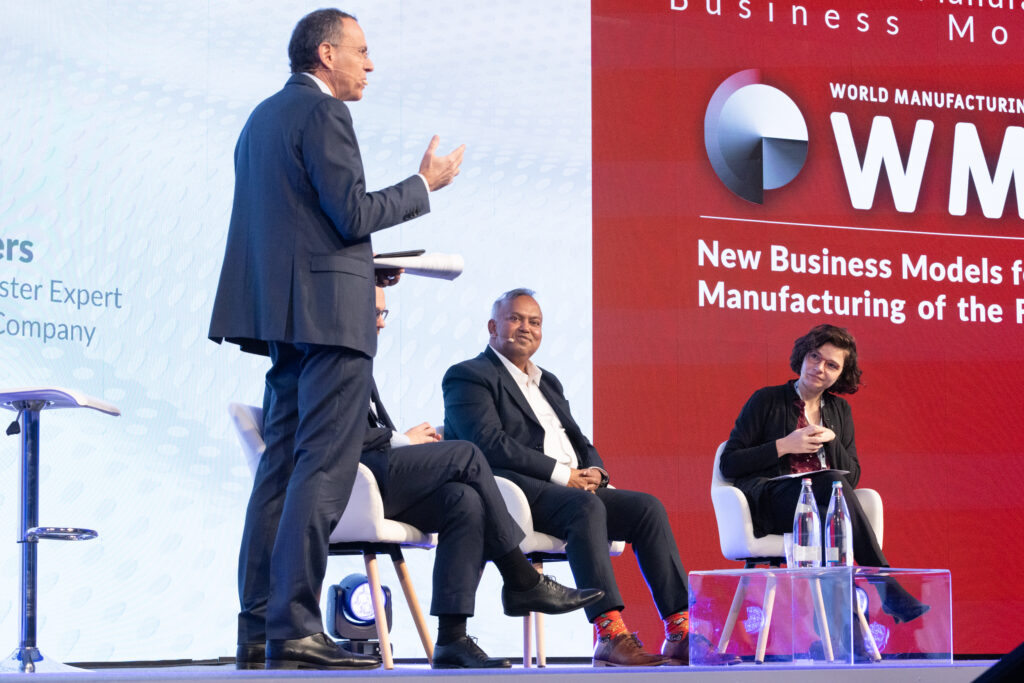
Caroline Viarouge, who has led EIT Manufacturing as CEO since May 2023, highlighted the importance of the collaborative discussion of the topics raised within the panel: “It is vital to get together in the World Manufacturing Forum to make this manufacturing European industry competitive at the global level, resilient and to build this net-zero European manufacturing industry by 2050”.
Clean energy, circular economy principles, skilled workforce, and cross-actor collaboration at the centre of the green transition
As EIT Manufacturing is positioning itself as the champion of human centricity in the green manufacturing transition and in building a sovereign and competitive manufacturing industry in Europe, Caroline Viarouge spoke of several focus areas of the unfolding green transformation: clean energy, circular economy, skilled workforce, and cross-actor collaboration.
While finding the right machinery and optimising the production processes were identified by Caroline Viarouge as essential in fostering the use of clean energy, the development of both hard and soft skills was characterised by her as pivotal for enacting the green transformation of the whole manufacturing industry.
“We will not be able to succeed in this transformation without the necessary skills and competencies”, she said.
Equally as relevant for the green transition, said Caroline Viarouge, is the collaboration between a variety of actors in the manufacturing domain. According to the CEO of EIT Manufacturing, engaging various actors across the value chain involves breaking out of comfort zones and abandoning siloed thinking to realise true impact. Moreover, as the detrimental repercussions of environmental degradation become increasingly noticeable around the world, the need for a truly global interaction between actors in the manufacturing field is evident.
Thinking deep and acting bold: what is needed to succeed in decarbonising the industry
The panel delved into the theme of decarbonisation, with Ken Somers of McKinsey 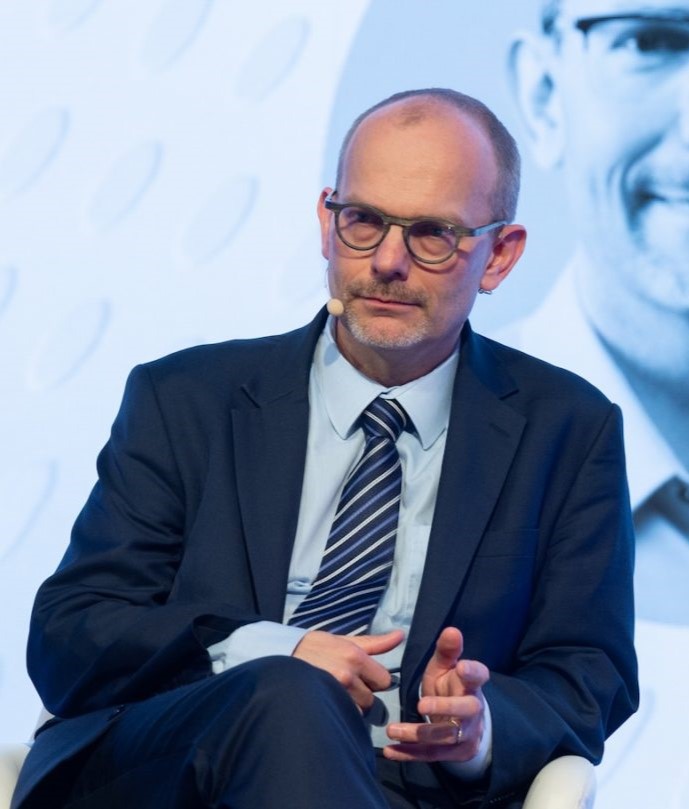 & Company highlighting a lack of attention to the topic of heat, despite its emerging significance. Somers stressed the need to go deep and be bold with innovative approaches, emphasising the importance of understanding energy usage and optimising performance management.
& Company highlighting a lack of attention to the topic of heat, despite its emerging significance. Somers stressed the need to go deep and be bold with innovative approaches, emphasising the importance of understanding energy usage and optimising performance management.
Acting boldly involves embracing innovative technologies, according to Somers. He urged the industry not to be hesitant in adopting new technologies, citing the need to capitalise on the innovation currently underway.
Digitalisation and sustainability at the centre of transformation in the automotive industry
Turning attention to the automotive industry, Andrea Cabrini asked Milan Kumar, CIO at ZF Commercial Vehicles, to provide insights into efficient ways of managing the gree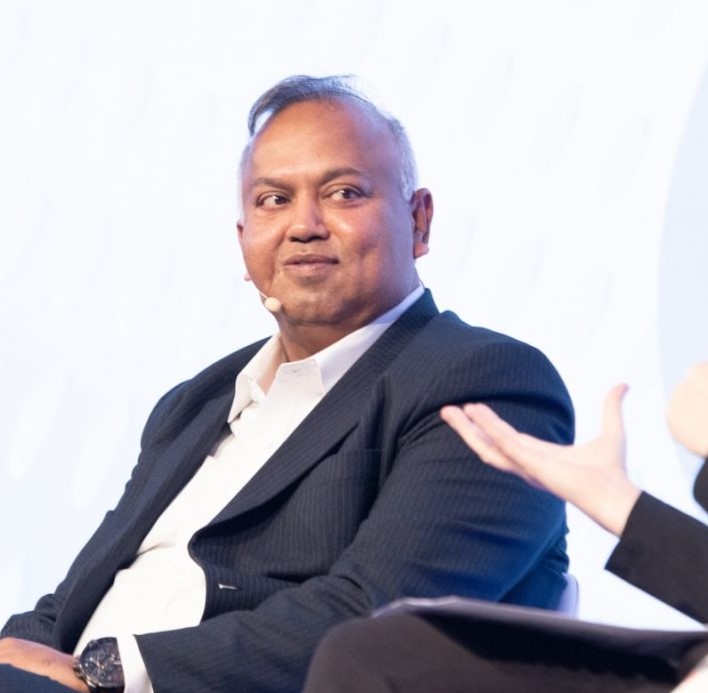 n transition.
n transition.
With an estimated 52 billion tons of greenhouse gasses emitted each year, said Kumar, achieving net-zero cannot be predicated upon wishful thinking: action is needed to address this problem of a truly global scale. At the same time, he added, as estimated by the World Economic Forum, the achievement of 10 out of 17 sustainable development goals is fully conditioned by technology.
This led Milan Kumar to identify digitalisation and sustainability as two mutually reinforcing “mega trends“. He emphasised the role of digital technologies in accelerating product development, particularly in the shift from combustion engines to electromobility. Quantum computing and synthetic data leveraging have played a pivotal role in accelerating production timeframes, making products more supportive of net-zero goals, according to Kumar. Analysing energy allocation data enables companies to visualise potential energy savings, charting a path towards the net-zero transition.
Artificial intelligence and robotics for a green transition in battery management
Addressing the digitalisation aspect, Caroline Viarouge underscored the enabling power of AI and robotics in securing the net-zero transition. She provided an example of EIT Manufacturing’s collaboration with one of its partners, COMAU, on a project using robotics for process optimisation in battery dismantling.
As electric vehicle production rises, digitalisation becomes essential for achieving circularity goals in battery recycling.
The clock is ticking. What is needed for the transition to happen soon enough?
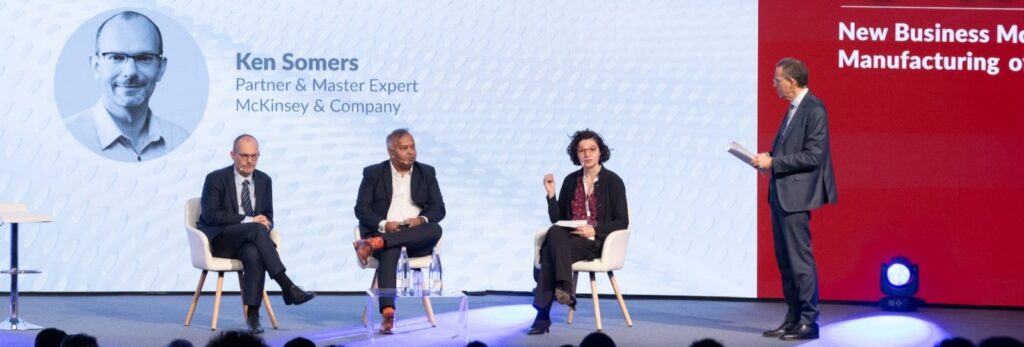
Caroline Viarouge addressed the reduced timeframe available for the industry to make the net-zero transition. Emphasising cross-actor collaboration, she stressed the importance of bringing innovation from outside the industry. Viarouge highlighted the need to boost diversity of skills and view the green transition from a broader perspective.
As some of the deadlines are approaching, preliminary projections emerge of the to-be-achieved results. Here, Andrea Cabrini was curious to know whether the new EU Commissioner’s prediction of a 57% emission reduction by 2030 was realistic from the point of view of the automotive industry, to which Milan Kumar’s response was optimistic, yet ambiguous.
Milan Kumar expressed optimism but emphasised the dependence on the industry’s ability to develop, test, and market products swiftly. Digital technologies were identified as key enablers for both the mobility and energy storage industries.
While optimistic about the possibility, Ken Somers described the 50% reduction target by 2030 as challenging due to the lengthy engineering process. He stressed the potential of thermal batteries in the net-zero transition, an aspect currently overlooked.
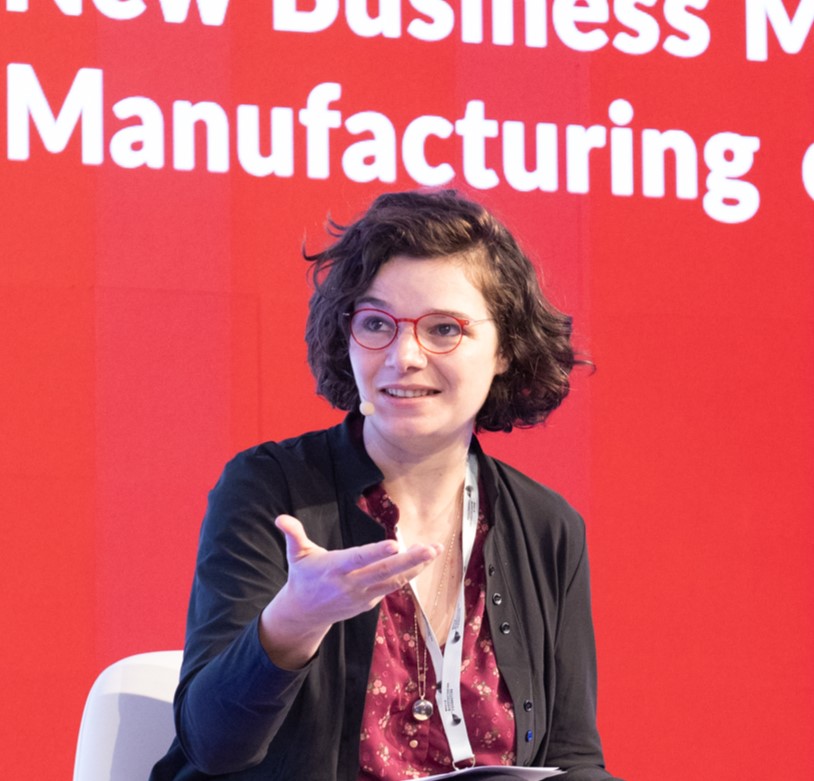 Caroline Viarouge expressed eagerness to break down existing barriers hindering the green transition and expressed confidence in European manufacturing’s ability to accelerate innovation. Learning from the experiences of the COVID-19 pandemic, she said, the European manufacturing industry becomes more agile when faced with challenges. Seemingly, such resilience is the reason why Europe may be set to become the world’s trailblazer in the net-zero transition.
Caroline Viarouge expressed eagerness to break down existing barriers hindering the green transition and expressed confidence in European manufacturing’s ability to accelerate innovation. Learning from the experiences of the COVID-19 pandemic, she said, the European manufacturing industry becomes more agile when faced with challenges. Seemingly, such resilience is the reason why Europe may be set to become the world’s trailblazer in the net-zero transition.
Looking ahead
In concluding remarks, Milan Kumar named reusability as the key foundation for the operating models of the manufacturing of the future, calling on to companies to lean on the best use cases and reuse, rather than reinvent.
Ken Somers underscored the centrality of engineering capacity in the green transition, emphasizing the need for a digital approach to engineering to free up capacity.
In response to a question about the financial sector’s readiness to support the net-zero transition, Caroline Viarouge lauded the financial sector’s openness to manufacturing investment. She stressed the need for scaling up and de-risking to address risk-aversion, actions currently undertaken by EIT Manufacturing to support startups.
Caroline Viarouge commended the event and reiterated the commitment to collaboration for the green transition in manufacturing: “I really enjoyed the discussion I had at the World Manufacturing Forum, and I truly believe that the collaboration is going to bring us forward into building this future-proof industry in Europe”.
